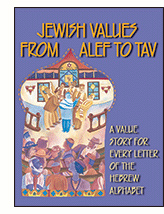 In “Jewish Values From Alef to Tav,” the text in the lesson on the letter Nun has the line, “Midrash tells us that Moses died as a very old man when God kissed him.”
In “Jewish Values From Alef to Tav,” the text in the lesson on the letter Nun has the line, “Midrash tells us that Moses died as a very old man when God kissed him.”
Josh was in Austin, Texas last weekend working with teachers at Congregation Agudas Achim and Temple Beth Shalom.
One of the teachers, Tammy S., mentioned that some of her students wanted to know more about this particular midrash. Josh gave her the short answer: “We got it from Rashi.” But he promised her more information. So here it is:
In Deuteronomy 34:5, the Torah says:
“So Moses the servant of the LORD died there, in the land of Moab, at the command of the LORD.” (JPS translation)
The translation is important. Here are some other versions:
So there died there Moshe, servant of YHWH,
in the land of Moav,
at the order of YHWH.
(Everett Fox)
Also:
And Moses, the servant of the Lord, died there, in the land of Moab, by the mouth of the Lord. (Judaica Press)
The Hebrew phrase in question is “al pi adonai” (‘עַל־פִּ֥י ה) which literally means, “by the mouth of God.” What does it mean to die “by the mouth of God”? Usually, as in the case of the phrase we use during the Torah service, we translate the phrase, “at the command of God.”
Rashi explains that this phrasing is special, and that it means Moses died by a “divine kiss.” As is often the case, Rashi is quoting earlier rabbinic material.
The Talmud (Bava Batra 17a) teaches that the Angel of Death had no power over Moses, Aaron, and Miriam. Rather, they died “al pi adonai.”
 That phrase is usually translated (see JPS) idiomatically as “at the command of God,” but it literally means, “at the mouth of God,” or “from the mouth of God.” The rabbis of the Talmud used this as a chance for wordplay. They’re saying that these people died “by the mouth of God,” and they conclude that this must mean that they died when they received a sort of “divine kiss.”
That phrase is usually translated (see JPS) idiomatically as “at the command of God,” but it literally means, “at the mouth of God,” or “from the mouth of God.” The rabbis of the Talmud used this as a chance for wordplay. They’re saying that these people died “by the mouth of God,” and they conclude that this must mean that they died when they received a sort of “divine kiss.”
The phrase “al pi adonai” is only used to describe death twice, in the cases of Aaron (Num. 33:38) and Moses (Deut. 34:5).
[As a side note, the rabbis included Miriam as also dying by divine kiss by employing another wordplay. In the case of Moses, the Torah says he “died there” (va’yamat sham), and the case of Miriam, it says she “died there” (va’tamat sham, Num. 2:1). According to the rabbis, this similar language is employed to show us that Miriam and Moses died in a similar fashion. Why not just say explicitly that Miriam died “al pi adonai,” by divine kiss? Because, according to the Talmud, “saying such a thing would be inappropriate in the case of a woman.”]
The Talmud is basically employing strong imagery to show that Moses, Aaron, and Miriam didn’t die by natural causes. Rather, they had to have the life “kissed” out of them. (For me, this evokes images of the Dementors in the Harry Potter books.)
Of course, Josh sent all this to Tammy, and she wrote back:
Hi Josh,
Thank you for the research and multiple answers. I loved the dementors image (and probably the students would too.) I guess they were too special to just die. I am glad I asked about it again. Now maybe I can satisfy my students’ curiousity.
Thanks again,
Tammy
Do you have a burning question about something you found in a Torah Aura book? Get in touch (or post a comment right here!) and we’ll get an answer for you, too.

